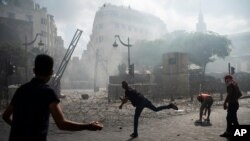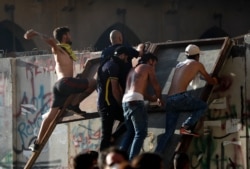Lebanese security forces fired tear gas Saturday at thousands of demonstrators who gathered in Beirut’s main square to protest the government’s management of the recent explosion that devastated large parts of the city.
At the beginning of a planned protest, a small group of men started throwing stones at security forces as they tried to jump over barriers that were blocking entry to the parliament building. Police responded by firing tear gas at the protesters.
A police spokesman said an officer was killed during scuffles. A police officer at the scene said that the officer died after falling down an elevator shaft when he was chased by protesters into a building in the area.
The demonstrators also stormed the foreign ministry building while others in Martyrs Square set up symbolic nooses for politicians and chanted, “The people want the fall of the regime!”
The protesters later set fire to a truck that was reinforcing barriers on a street leading to the parliament building.
The Lebanese Red Cross said more than a dozen protesters were hospitalized and scores of others received medical treatment on the scene.
The protest, the first significant demonstration since the explosion, occurred amid mounting anger at Lebanon’s political leadership.
Hisham Harb, a student at Lebanese University, told VOA that "just about everyone is mad, scared and angry" — angry at the government, at the politicians, and at what he called the gangsters who run the country. "Everyone," he said, "has friends and family members who were killed or injured in the explosion, and everyone is mad as hell."
The country’s leaders have been accused of widespread corruption and incompetence that contributed to Tuesday’s devastating explosion, which killed at least 158 people and injured about 6,000 others.
Prime Minister Hassan Diab said Friday that he would draft legislation calling for early elections and was willing to remain in the position for two months to allow political leaders time to implement structural reforms.
The head of the Kataeb Party, Sami Gemayal, told mourners at the funeral of party Secretary-General Nazar Najarian on Saturday that he was withdrawing three party members from parliament amid the fallout from the explosion.
Progressive Socialist Party and Druze leader Walid Jumblatt told Arab media he was calling for early parliamentary elections and that protesters have the right to demand that political leaders resign.
Jumblatt said, however, it is up to Christian protesters and Christian political parties to call for an end to the mandate of President Michel Aoun.
Christian political leader Samir Geagea has also called for early parliamentary elections but stopped short of withdrawing his party’s members from parliament.
Visiting Arab League head Ahmed Aboul Gheit told journalists the 22-member body would "support Lebanon through all available means" after meeting with President Michel Aoun. Aboul Gheit and other world leaders, including U.S. President Donald Trump, say they will take part Sunday in a donor's conference for Lebanon in Paris.
The U.S. Embassy in Beirut said Saturday that the U.S. government backed the demonstrators’ right to protest peacefully and was urging them to “refrain from violence.” In a tweet, the embassy also said the Lebanese people “deserved leaders who listen to them and change course to respond to popular demands for transparency and accountability.”
The United States is delivering emergency aid to Lebanon, starting with food, water, and medical supplies, under the direction of President Donald Trump, national security adviser Robert O’Brien said Friday.
In addition, the U.S. will continue to work with authorities in Lebanon to identify further health and humanitarian needs and will provide further assistance. The U.S. Agency for International Development is deploying a disaster assistance response team to help with coordination and delivery of assistance, the statement said.
The Trump administration has initially pledged more than $17 million in disaster aid for the country, Secretary of State Mike Pompeo said, and “will continue to help the Lebanese people as they recover from this tragedy.”
Russia flew in a mobile military hospital along with 50 medical workers. Qatar also was sending a field hospital, while Iraq was supplying a crew of medical workers and truckloads of supplies.
Tunisia offered to take in patients for treatment, and Germany dispatched a team of rescue experts and search dogs.
Cash pledges have came in from Australia, Britain, Hungary and other countries.
In addition to providing aid, Pompeo said, the U.S. is joining other nations in the call for “a thorough and transparent investigation” into the cause of the explosion.
Human Rights Watch was the first to call for an independent investigation of the explosion. The group said international experts should be allowed into Lebanon to “determine the causes and responsibility for the explosion and recommend measures to ensure it cannot happen again.”
Lebanese authorities believe that 2,750 tons of ammonium nitrite stored in warehouses for the last six years fed the explosion this week.
Officials said they expected the death toll to go up as they picked through the wreckage. Initial damage estimates were as high as $15 billion.
U.N. rescue workers searched the wreckage for survivors Friday. French and Russian rescue teams with dogs also searched the area.
Health officials also feared the disaster would aggravate the coronavirus outbreak as victims packed hospitals and the homeless sought shelter.
Edward Yeranian contributed to this report from Cairo.








